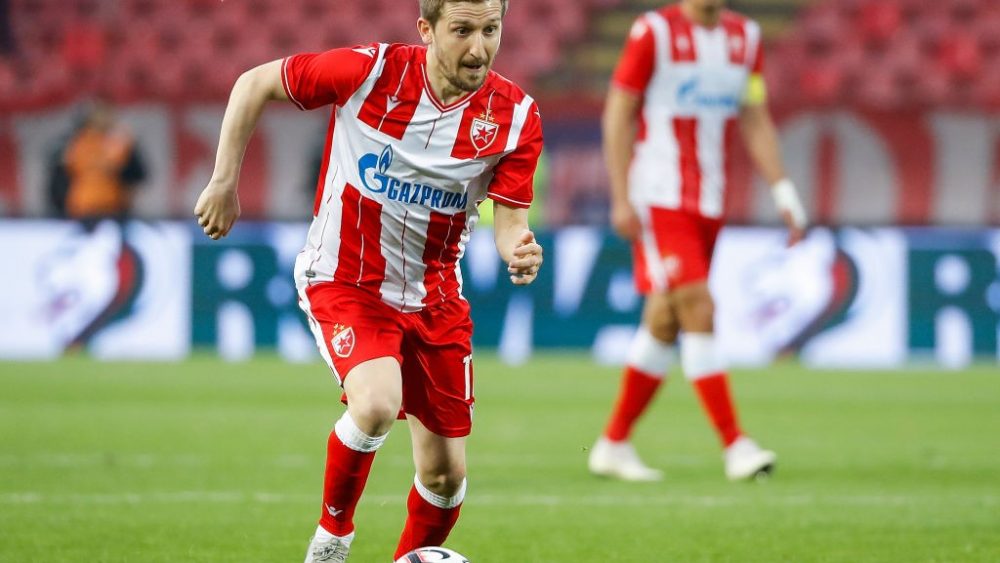Champions League Preview: ‘Star of the South’ against Red Star
Bayern will not be happy with their 1-1 draw against Leipzig. Their performance was excellent in the first half and too mediocre in the second. Yet everything might have turned out positive if Süle had converted his last minute header which was literally the last action of the game. Alas, things being as they are, he did not and so Bayern failed to claim the top of the table for the first time this season.
Nevertheless, Bayern will be encouraged by how they conducted the first 45 minutes of the match. There they proved that they are still the best team in Germany. How often they are capable of delivering performances like that throughout the season will be crucial in their chase to win an eighth straight title.
Bayern also has high ambitions for the Champions League. After the well-deserved and comprehensive defeat against Liverpool last season, Niko Kovač and his team intend to do better this time around. They have stated their aim as wanting to reach at least the quarter-finals and thus improve on last year’s result. On their way there, the Champions League group stage will only become a stumbling block if they make it unnecessarily difficult for themselves.
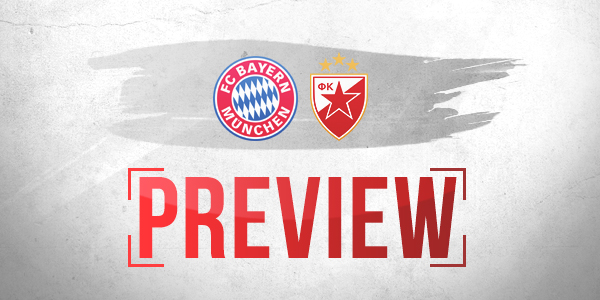
FK Red Star Belgrade: echoes of a stellar past
Matchday 01 sees a five-time Champions League winner facing off with a one-time Champions League winner: Bayern Munich against FK Red Star Belgrade. In 1991, the Serbian club won the “European Champion Clubs’ Cup” (as it was called back then) after beating Olympique Marseille in the final on penalties.
On their way to the final in Bari, Red Star beat Grasshopper Club Zurich, Glasgow Rangers, Dynamo Dresden – and a certain FC Bayern in the semi-finals. After a 1-2 loss in their home game, Bayern only managed a 2-2 draw in the return leg, thus failing to make the final. A spectacularly clumsy own goal by a combined effort of Klaus Augenthaler and Raimond Aumann in the 90th minute marked the end of Bayern’s Europa Cup dreams that year.
Then coach Jupp Heynckes had promised amidst Bayern’s public title celebrations just the year before that they were going to bring the European Champion Clubs’ Cup to Munich next year. The defeat against Red Star was the beginning of the end of his tenure at Bayern. In 1991, he was sacked by his friend Uli Hoeneß. Nevertheless, in 2013 he ultimately managed to make good on his promise with only a slight delay of 22 years.
A decline of many facets
22 years lie between these two events. 22 years of ups and downs for Bayern. But for Red Star, these 22 years were much more than just a sequence of a few ups and downs. For them, this period witnessed their constant decline as a football club to the point of insignificance. Their European title in 1991 marked the beginning of a decades long slump. Many factors – the Balkan wars, the dictatorship under Slobodan Milošević, UN sanctions, and a general state of unrest and uncertainty the Serbian society went through in the 1990s and early 2000s, contributed to Red Star almost completely disappearing from the European football landscape. The club was hit hard by most of the title winning players leaving as well as several UEFA sanctions down the years. All of this lead to enormous financial consequences for the club and they have never entirely recovered.
Between 1991 and now, there has only been one more clash between Red Star and Bayern. This took place in 2007’s edition of the UEFA Cup. The two teams met in the group stage where Bayern won away to Red Star in Belgrade 2-3 thanks to late goals by Miroslav Klose and man of the match Toni Kroos. Since then, their head-to-head stands at 2 wins each, 1 draw, and 10-9 goals for Bayern.
Domestically at least, the club has managed to follow up on old time glory in recent years. Since 2014, they have won the national championship four times (2014, 2016, 2018, 2019). Their closest national rival is Partisan Belgrade, who won six successive titles from 2008 to 2013. In Serbia’s all time rankings since the Serbian independence, the two clubs are just 23 points apart. Red Star are Serbia’s record champions having won the league 30 times and the national cup 24 times. Last season, they managed to qualify for the Champions League group stage for the first time since the cup started in its current form in 1992. They repeated this feat this year. So on paper at least, Red Star appears to have finally regained their long-lost place among the European football elite.
Back for a surprise?
Last year, Red Star was drawn in a group with PSG, Liverpool, and Napoli. Considering the quality of the opposition, they acquitted themselves fairly well. Even though they failed to qualify for the knockout stages with just four points to their name, as you would expect, they still managed to put down the occasional marker. Their 0-0 draw against Napoli and their 2-0 win against Liverpool in front of 50.000 spectators at home were two of the most celebrated highlights of their football year.
This season too the club intends to deliver a respectable performance in a group with Bayern, Tottenham, and Olympiacos. Their season’s home record in the league so far is spotless with six wins from six. Their coach Vladan Milojević favours a 4-2-3-1 shape, but is apt to tinker with his midfield setup from time to time.
Six wins from six in the league sounds impressive but their way through Champions League qualification should be more indicative of their actual strength. Here, Red Star had a more bumpy road to negotiate. While they still managed to go through in normal time against Suduva (0-0, 2-1) and Helsinki (2-0, 1-2), they had to go to penalties against Copenhagen and extra time against Young Boys, whom they beat on away goals.
Marko Marin pulls the strings in midfield
If Red Star were able to come away with a point or even three from the two matches against Bayern, this would doubtless be considered an upset. In all likelihood, they will get very few opportunities to score in both of their games against Bayern. But Red Star is an efficient side that usually does not need many chances to score a goal.
One reason for this is Marko Marin. Once upon a time he was one of Germany’s most promising and brightest young talents, but then his career somehow took a turn for the worse. He soon left Germany and has since enjoyed the fate of a journeyman traveling from club to club across Europe. Yet all in all, his career does not deserve half the mockery it often receives. The former German international is very agile, technically skilled, and good at connecting defense and offense in a way that turns an otherwise unstructured Red Star game into a coherent whole. He is often the one who resolves situations of defensive pressure by playing a well timed and precise long ball up front.
Even though Bayern will be in possession most of the time during Wednesday’s game and therefore will have to focus on their own actions on the ball, they will also have to keep an eye on Marin and close him down quickly when he has the ball.
Problems with keeping the shape
Red Star’s primary weakness is their inconsistency against the ball. They struggle with maintaining a compact shape for longer periods and allow spaces between the lines to occur as soon as they have to pay attention to too many opposition players at once.
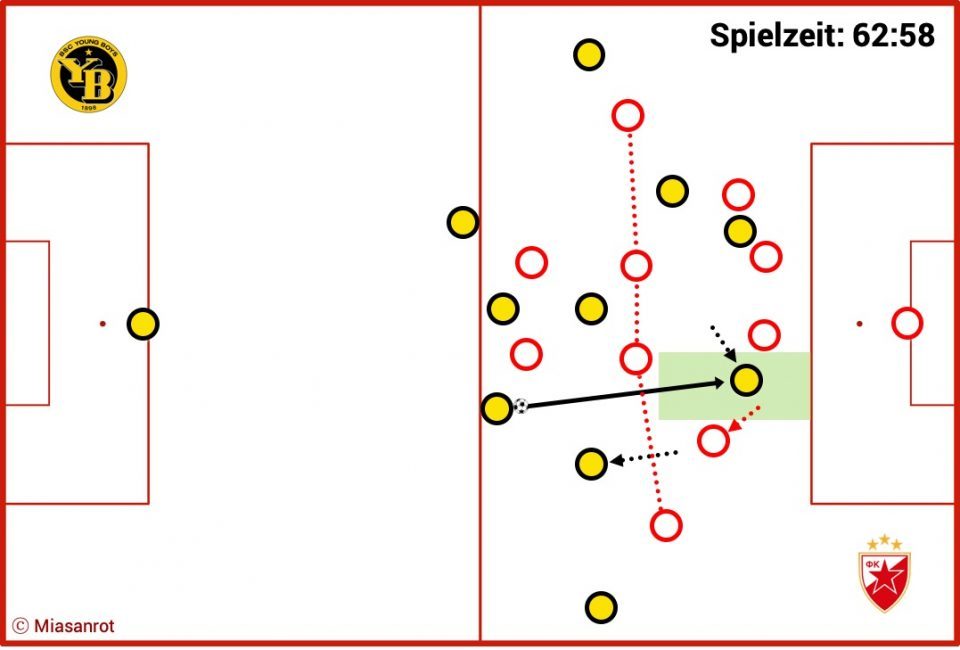
This situation from the 63rd minute of the Champions League qualification return leg against Young Boys shows that small tricks are enough to destabilize Milojević’s team. Young Boys’ two full-backs stay wide and draw Red Star’s wingers out while their central midfielders and tucked-in wingers cause Red Star’s midfield to contract. Then, one of Young Boys’ forwards moves slightly outward, dragging one of Red Star’s defenders out with him which opens up a dangerous area for Young Boys to exploit in their attack (green).
For Bayern this means that they will need to employ similar means to open up spaces against Red Star. Thomas Müller did this very well in the match against Leipzig. With a realistic expectation of 70% in possession, Niko Kovač might even consider deploying a very offensive formation. Thomas Müller as the man to create spaces and Couthino as the player exploiting these openings with the full-backs guarding the half spaces would conceivably be a smart tactical move for him to make.
Problems with second balls
Another one of Red Star’s weaknesses lies in defending second balls. Throughout their Champions League qualification they conceded chances because they could not always secure their defensive hinterland.
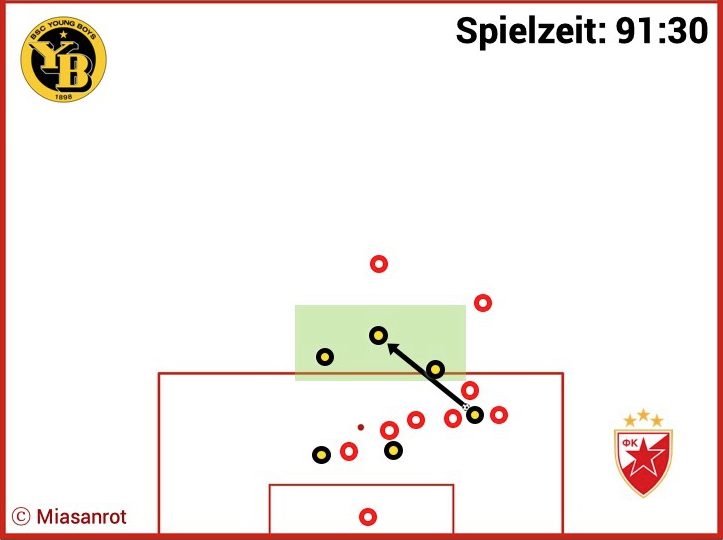
Having to score for a second time, Young Boys steadily increased the pressure towards the end of the game. Red Star concentrated on defending their own goal, almost conceding several times in so doing. The graphic above depicts the chaos among Red Star’s players after the second ball, which somehow found its way to a Young Boys player despite a heavy numerical advantage for Belgrade. Luckily for them, Young Boys’ shot on goal went begging.
What Bayern can learn from this is that they should not just use their forwards to keep Red Star’s last line of defense occupied, but also populate the space behind their first line to enable them to exert pressure in second ball situations and make use of Red Star’s fragility there.
FC Bayern: on a good way?
After lacklustre performances against Schalke and Mainz, Bayern proved against Leipzig that they can do better. This was largely the result of some clever adjustments in which they managed to fill some of the large holes they previously had in the midfield.
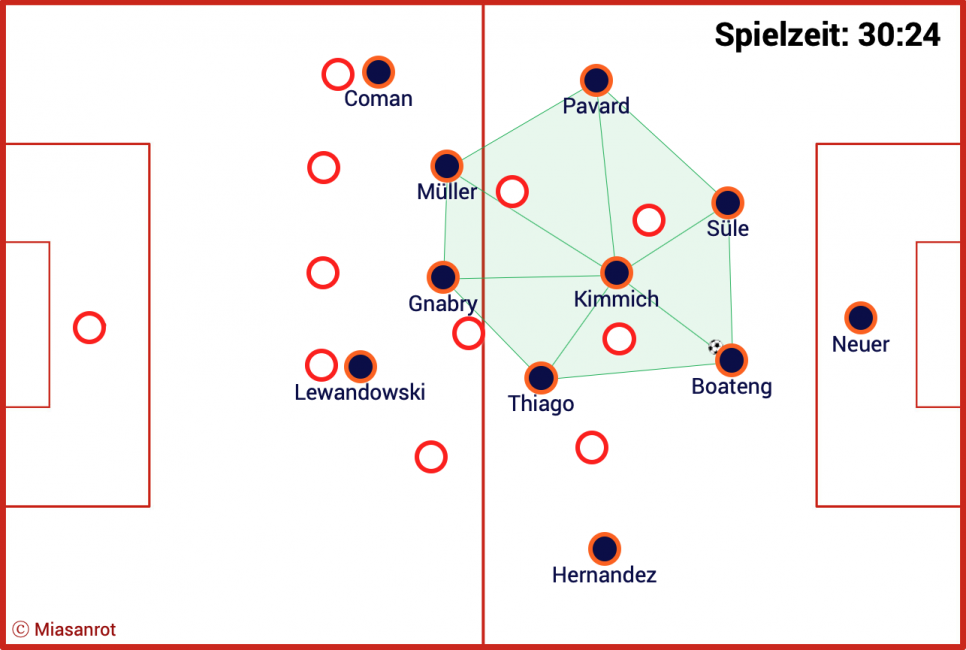
This scene in the 31st minute is but one of many positive examples. Instead of dropping back between the two centre-backs, Joshua Kimmich stayed in his holding midfielder’s position. He could do so not least because he received more and more regular support from the players close to him. Thiago and Müller kept close to him more regularly than in previous matches. Serge Gnabry also moved inside frequently to create overload situations on the right-hand side.
In setting his team up this way, Kovač precisely anticipated Leipzig’s plan to put pressure on Pavard to force him to submit the ball. The French international almost always had enough passing options available to him which allowed him to escape the pressure. Moreover, Bayern created depth by moving up field in a tightly and coordinated fashion without losing shape. They repeatedly played long, vertical passes forward to one of the men up high who would deflect the ball back to a teammate who was pushing up and then had the entire game ahead of him. This is not a tactic that Bayern has regularly employed since Kovač took over as coach.
Once they had arrived in the half spaces, Bayern knew well how to involve their wingers and Lewandowski. That the half time score read only 1-1 was not just due to a reckless mistake by Thiago but also Bayern’s repeated failure to conclude their attacks with a successful finish. Leipzig could not have complained had they gone into half time with a substantial deficit.
Intense (gegen-)pressing
Bayern supporters have little reason to complain about either their team’s game in possession or against the ball at the moment. This might sound strange in light of seven goals conceded in only six games. Yet all of the conceded goals fell after moments of inattention or careless mistakes in positional play by individual players causing a string of subsequent problems in transition.
If Bayern goes through longer periods against the ball however, they often are quite stable and well coordinated and have improved their pressing as well. Against Hertha they found the right answer to Hertha’s back three in moving their wingers a little bit towards the center in their 4-3-3 and switching to a proper 4-4-2 after Hertha had done this minutes earlier.
Bayern’s high pressure game has caused most opposing teams difficulties and not allowed them sufficient time for proper decision making. RB Leipzig realized this and demonstrated how to escape Bayern’s pressure by changing formations. After their switch to a 4-2-2-2, they were the commanding team. Up till the end of the match, Bayern did not find a way back to the same level of dominance and control they enjoyed in the first half. They only achieved an xG-value of 0.35 in the entire second half including Süle’s almost game winning chance in stoppage time.
Gegenpressing as playmaker
Yet Leipzig too only accumulated an xG-value of 1.65 throughout the match. The penalty alone that Thiago initiated by his mistake contributed 0.76 to the entire amount. So Bayern managed to contain Leipzig to 0.89 xG plus a gift, which is not too bad at this level of competition.
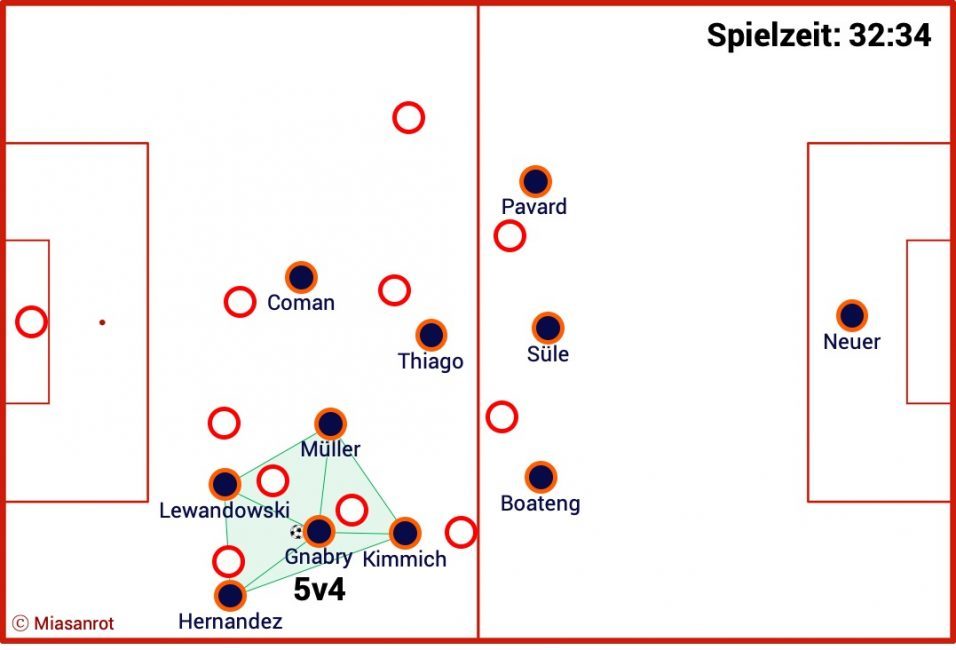
A situation in which Bayern win the ball in the 33rd minute serves as a good example of this. By shifting their positions intelligently Bayern’s players force Leipzig to play an uncontrolled pass out to the wings where Leipzig is outnumbered five to four. Bayern managed to do this several times, but they failed to come up with clear goal scoring opportunities from These situations. The example used here for instance should have yielded more than just a harmless shot from distance.
Because Red Star will not have as much time on the ball as Leipzig, there will be fewer situations where gegenpressing is the best playmaker (loosely drawing on Jürgen Klopp). Bayern needs to create chances against a deep seated monolithic block of players, a task they have so far struggled with this season.
The devil is in the details
Even though Bayern have improved their game in possession, the final degree of precision has so far eluded them. They appeared to have no idea how to break down Leipzig’s very compact midfield in the second half. They resorted to their traditional means of creating chances by driving in increasingly hapless crosses in lieu of pursuing the more effective route of concentrated positional play. An xG-value of 0.35 in the second half is testament to this. Only Tolisso’s finish in the 63rd minute provided a brief moment of brilliance.
Bayern needs to improve in this department in the coming weeks. Their game against Red Star will not be a great indicator as to their level of tactical proficiency. But as soon as they face teams like Dortmund and Tottenham, their tactical skills will be decisive. Thomas Müller mentioned after the game that he wanted his team to be able to react quicker to an opponent’s in-game adjustments. Kovač’s substitutions of Davies and Tolisso brought stability but no offensive power. A tactical change along with his personnel change might have been the right thing to do in light of how the game had developed. This remains a small tinge of regret in what was otherwise a markedly improved performance by Bayern.
In the Champions League especially, it will be crucial for any team that wants to be successful to be able to react and adjust to the changing tides of a game. The role of the coach in this must not be underestimated. Kovač has proven against Leipzig that he is able to prepare his team for big matches against quality opposition. The next step for him will be to enable his team to have several alternative tactical options at the ready in order to answer any of their opponent’s moves. Having the ability to coach a team to be able do this is not only the small difference between a good and a very good coach, but also the small difference between success and failure.



